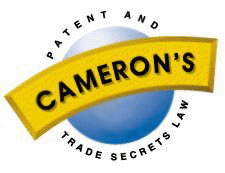
Case Comment
Farbwerke Hoechst A.G. v.
Halocarbon (Ontario) Ltd.
citation(s): (1974) 15 C.P.R. (2d) 105 (F.C.T.D. per Collier J.)
 Case Comment |
Farbwerke Hoechst A.G. v.
|
copyright 1997 Donald M. Cameron, Aird & Berlis
"It is conceded by the defendants that if the process used in the United States to produce isohalothane was used in Canada for the same purpose, there would be infringement of claim 10.
The plaintiff says the Canadian defendant is therefore liable on the basis it imported into and used in Canada a product produced elsewhere by a process which infringes its patent rights. Reliance is place on Union Carbide Canada Ltd. v. Trans-Canadian Feeds Ltd. et al (1965), 49 C.P.R. 7, [1966] Ex. C.R. 884, 32 Fox Pat. C. 17 and Societe des Usines Chimiques Rhone-Poulenc et al. v. Jules R. Gilbert Ltd. et al. (1967), 55 C.P.R. 207 at p. 209, 35 Fox Pat. C. 174(this decision was affirmed 55 C.P.R. 207, 69 D.L.R. (2d) 353, [1968] S.C.R. 950, but this particular point was not discussed). In the Union Carbide case, the President (now Chief Justice) said at pp. 12-4:
I shall first dispose of the question of law as to whether importation into Canada, and use or sale in Canada, of goods that were made outside Canada in accordance with a process that is the subject of a Canadian patent is an infringement of that patent.... in Auer Incandescent Light Mfg. Co. v. O'Brien (1897), 5 Ex. C.R. 243 Mr. Justice Burbidge had to consider an application for an injunction based upon a process patent where some of the infringements complained of were with respect to manufacture (see pp. 262-3) and, after hearing argument on the question, at p. 292 he applied the two English cases to which I have referred and held that articles made in a foreign country pursuant to a process in respect of which a patent had been granted under the Canadian statute cannot be imported for use or sale in Canada without infringing the Canadian monopoly.
While I appreciate that the doctrine of stare decisis does not have the same application in this Court, which has jurisdiction in the Province of Quebec as well as the common law Provinces, as it does in a common law Court, nevertheless, in my view, where a question has been decided by this Court after argument, it is in the interest of the orderly and seemly administration of justice that the decision be followed when the same question arises subsequently in this Court, in the absence of special circumstances, the nature of which I am not prepared at this time to define. I should also say that, as far as I have been able to ascertain, there is no relevant difference between the Canadian legislation that was under consideration in the Auer Incandescent Light case and the present legislation.
While, as I see it, the question would be open for reconsideration in the Supreme Court of Canada, I propose, having regard to the views expressed above, to follow the decision rendered by Mr. Justice Burbidge in 1897 so long as it authority remains unimpaired by a decision of the Supreme Court of Canada. In adopting this position, I do not wish to be taken as expressing any opinion as to the course that should be followed when a similar problem arises in this Court at a time when this Court is differently constituted.
I was invited by Mr. Hughes to distinguish, on a number of grounds, the Union Carbide case and the cases referred to by Jackett, P. I do not see any reasonable grounds for so doing. I echo the comments of Thurlow, J., in the Rhone-Poulenc case at p. 257:
[This point] ... has been raised frequently in this Court and has been decided against the defendants' contention on a number of occasions, the latest of which was a judgment of the President of this Court in Union Carbide Canada Ltd. v. Trans-Canadian Feed Ltd., 49 C.P.R. 7 at pp. 12-4, 32 Fox Pat. C. 17, [1966] Ex. C.R. 884, where the principle and the authorities on the question are discussed. In the absence of any expression of opinion to the contrary by the Supreme Court I would in any event regard the point as settled in this Court and hold against the defendants' contention."
Return to:
: Home Page; IndexCameron's IT Law
: Home Page; IndexCameron's Canadian Patent & Trade Secrets Law
JurisDiction Home Page